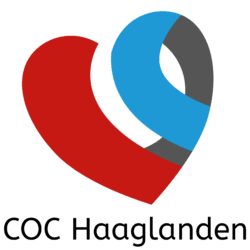In honor of Pride month, we would like to give the spotlight to one or a few of our volunteers. Our enthusiastic information officer Marnix, who is now also helping to set up a Pride in The Hague, talks passionately about his experiences at schools:
“Giving information is something you have to lie about. Of course you can learn some basic skills, such as basic pedagogy or how to present, but without the necessary passion your message will not get across.
Although I have only been providing information on behalf of the COC since this year, I have always had it in me.
From an early age I was noticed by my appearance. [Albinism; white skin and hair.] I enjoyed explaining to the people around me how this came about and was always ready to start a conversation and answer questions in an open way.
When I came out as a transgender man at the age of 24, this was no different. Most transgender people hate having to answer the same questions over and over again, such as: 'What does your partner think?' "How did your parents react?" "Have you had the surgery?" "What was your name before your transition?" – I don't mind at all. Of course there are questions I don't want to answer, but even then I like to start the conversation and explain why I don't want to answer that question, or explain how things are going 'in general' .
By providing information at schools, we offer students the opportunity to ask us these kinds of 'rude' questions. Questions that, if left unanswered, can lead to misunderstandings and incomprehension. Of course, it often feels vulnerable to share such personal things with a group of young people, but it's for a good cause. By showing that we as queers 'are just people too' and by opening up the conversation, we can work towards a world with more understanding and connection.
In addition, young people are more open and a lot less rigid than adults. They can sometimes seem disinterested, primitive or short-sighted, but you often find that they really want to listen to you and learn from you.
After the introduction, we explain concepts such as 'gender', 'attraction' and 'gender' using the 'genderbread person'. Then we play a game with the class in which they can fill in this gender bread for an information officer. Usually we let them do this for me, because I'm one of the few transgender educators and therefore just the most compelling to this game.
Often the whole class thinks that I was 'just' born as a man, but that I feel non-binary. [I identify as a man, but I am not exclusively male in expression.] The fact that I was born as a 'girl' is generally not even that shocking to young people, except that I am regularly asked how I am so muscular. am or why I have such a low voice. The fact that I identify myself as a man sometimes causes confusion. I like to ask students why they think I'm non-binary; it often takes quite a while before a student gives an honest answer. What they don't know is that, of course, we have the same conversations over and over and we already know what they're going to say, and that I kind of care about it too.
As soon as a student has made a comment about my colorful clothing, nail polish or long hair and I have explained that there is a fourth component to the genderbread person, namely gender expression, you notice that the penny starts to drop. You always only see a small part of someone. You cannot see how someone was born, who someone falls in love with or how someone identifies. In the end, we are all human. And what gives me satisfaction as a human being is when I see this message landing.”
Are you also enthusiastic about information after reading this? You can read more here or sign up at this link!


No comments yet